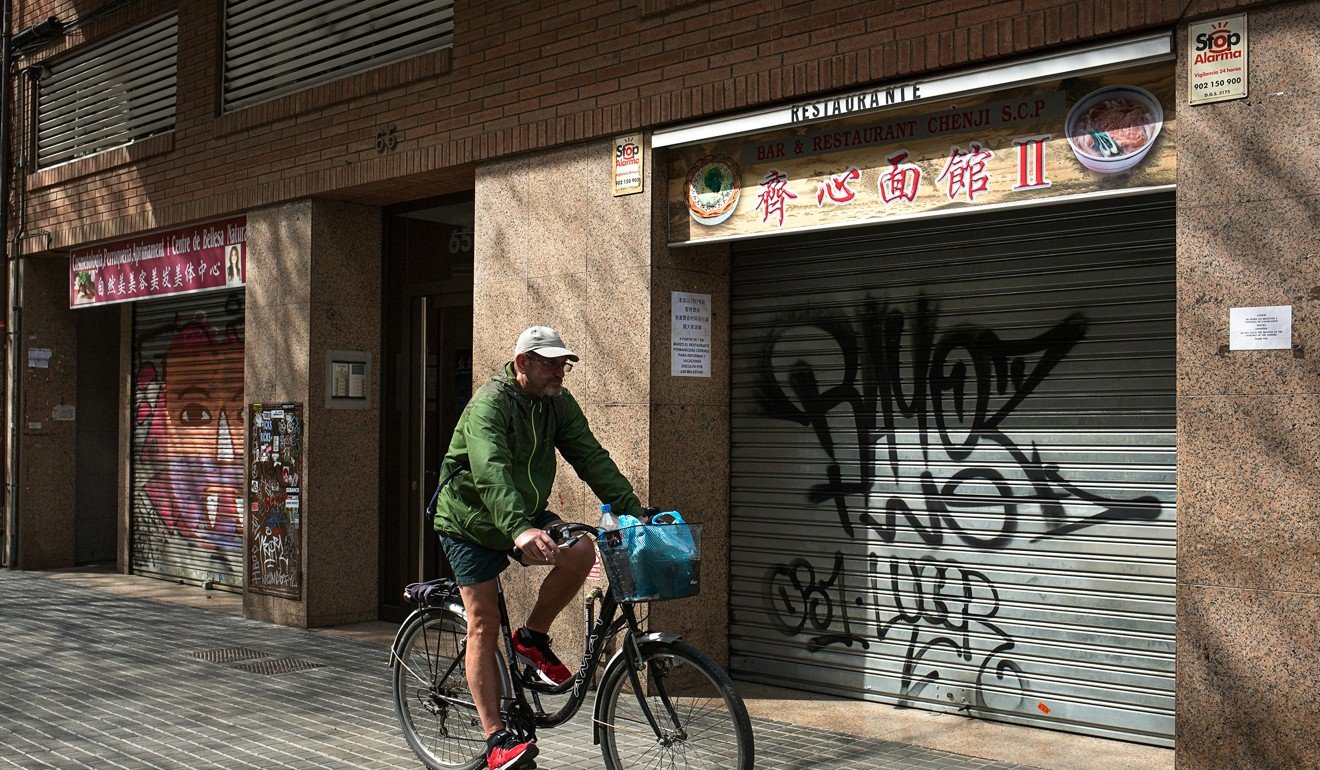
Spain’s Chinese community’s fight against coronavirus and xenophobia started early
- Weeks before the country went into lockdown, many Chinese-run shops had closed and workers in the remainder wore masks
- When the infection arrived, fears of racially motivated insults were realised from abuse on the street to social media attacks
“Because of the fear experienced in China, we see the epidemic differently than Spanish people,” said Xiao Kangyung, 36, who was born in Shanghai but has been living in Spain since 1996.
“In China, the situation is experienced at the other extreme of communication practice. We spread fear to the population to get people to stay home. So we have the feeling that the Spanish people have taken everything lightly, and haven't made the right decisions,” she said.
The country of 46 million people has quickly become a hotspot for the disease in Europe, second only to Italy, where there have been 1,002 deaths and 19,980 contagions to date.

The decree limited all movements except the essential – going to work, buying food or medicines, visiting the bank or attending to dependent people – for 15 days. Schools, universities, shops, bars and restaurants were all closed. And, from March 16, land borders were closed to everyone except Spanish nationals and residents.
For Spain’s 200,000 strong Chinese community, which had already been taking steps to minimise exposure to the virus, the government’s measures came too late. Signs had begun popping up on storefronts of Chinese-run shops at the beginning of March, saying “closed for holidays until the end of March” or “closed until further notice”.
The number of businesses that closed due to the coronavirus ahead of the government-mandated lockdown is unknown, but Xiao, a lawyer and adviser to freelancers and SMEs, said “half of her clients” had done so.
Workers in the few stores which remained open before the lockdown wore face masks and notices next to cash registers apologised and explained the measure to customers. “We are sorry to use the masks at work. The reason is to better protect the entire population”, read a note in a Barcelona food store last week.

In Xiao’s view, the Spanish government may have underplayed the situation at first to avoid stigmatising the country’s Chinese population but, since the first cases emerged in Spain, the authorities had failed to anticipate events and had improvised their response, she said.
However, if the government intended to protect the Chinese, it did not work out so well. When the outbreak arrived in Spain, there were multiple reports of people with Asian features being verbally attacked on the streets.
“The other day a boy yelled ‘coronavirus!’ at me. I know of other cases – in which a Spaniard would say to a Chinese, ‘Why don't you go back to your country?’,” Antonio Liu Yang, 40, said.
Liu is from Beijing and has lived in Spain since 1990, where he works as a lawyer and intercultural facilitator. He also leads the “I am not a virus” campaign, a movement that replicated an international one which began in other European countries such as Britain, Italy, and France, to address the wave of xenophobia sparked by the virus.
Liu said the movement was launched for prevention. “If they start calling the coronavirus the ‘China virus’, the name will have a racial connotation, and with all the information over-saturation there is, they will think that because we are Chinese, we have the virus, and we have to suffer the side effects of all this,” he said.
Worries over anti-Chinese xenophobia were confirmed when Ortega Smith, secretary general of Spain’s far-right party Vox, was diagnosed with Covid-19 – the disease caused by the new coronavirus. Smith took to social media during his home quarantine to say he was “recharging” forces so his “Spanish antibodies” could fight against the “damn Chinese virus”.
The famous Spanish actor Santiago Segura also posted a vulgar anti-Chinese message on Twitter, blaming them for eating “semi-raw pangolin and bat soup”. Liu said the Chinese community would file a lawsuit in response.

Liu said it was curious how roles had reversed between the two communities in Spain. At first singled out on the streets, Chinese people were now rejecting contact with the Spanish for fear of contagion. Through it all, Spain’s Chinese population had remained united through WeChat groups, he said, and had sent several letters appealing for communities to adopt more stringent protective measures against the virus.
A few weeks later, when the outbreak arrived in Spain, they launched a similar effort with a different purpose – distributing masks to pedestrians and raising awareness about their use. But, as the Overseas Chinese Association in Aragon – an inland region in the northeast of the country – pointed out, “it will be the last time, because it is difficult and expensive to find these medical supplies these days.”
Purchase the China AI Report 2020 brought to you by SCMP Research and enjoy a 20% discount (original price US$400). This 60-page all new intelligence report gives you first-hand insights and analysis into the latest industry developments and intelligence about China AI. Get exclusive access to our webinars for continuous learning, and interact with China AI executives in live Q&A. Offer valid until 31 March 2020.
